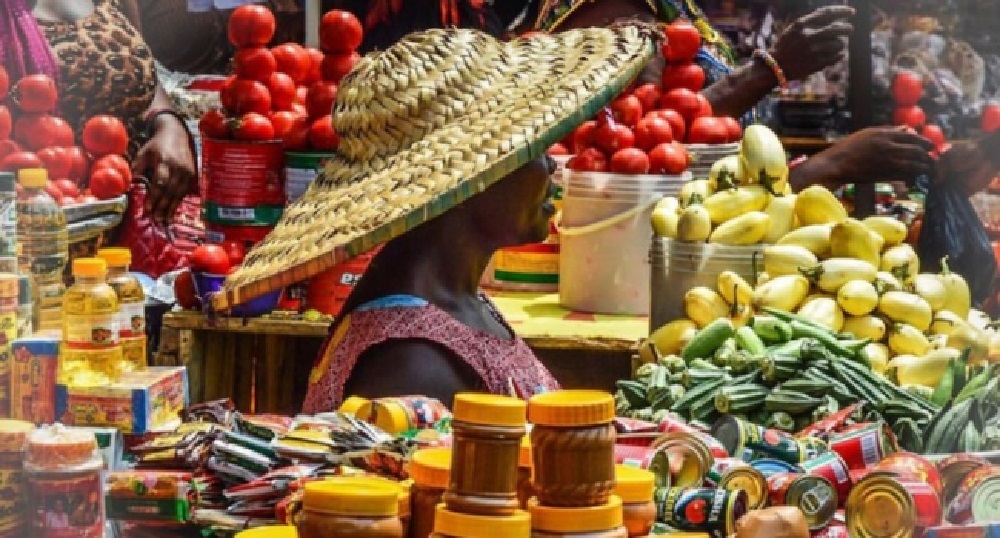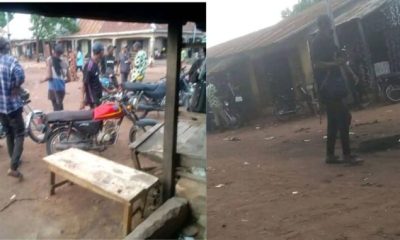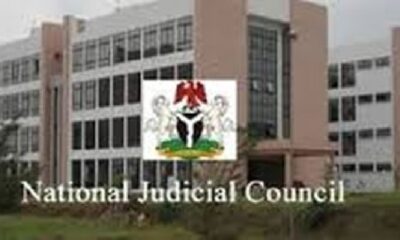Economy
CBN restricts Dollar from BDC to $10k for school fees, $5k for medicare

The Central Bank of Nigeria has placed limits on the foreign exchange sales by Bureau De Change (BDC) operators in a new document titled: “Revised Regulatory and Supervisory Guidelines for Bureau De Change Operations in Nigeria”.
The circular with Ref: FPR/DIR/PUB/CIR/002/006 dated February 23, 2024 and titled: “Revised Regulatory and Supervisory Guidelines for Bureau De Change Operations in Nigeria – Exposure Draft,” was signed by the Director, Financial Policy and Regulation Department, Mr Haruna B. Mustafa.
In the reversed regulatory guidelines, CBN stated that BDCs may sell foreign currency in the equivalent of $4,000 and $5,000 for personal travel allowance (PTA) or business travel allowance (BTA), respectively, to an individual once every six months.
According to the Bankers’ bank the sale of foreign currencies to the intending travellers would have to be accompanied with their bank verification number (BVN) or tax identification number (TIN), duly completed e-form, valid international passport, valid visa, as well as valid international return ticket.
In addition, for BTA, the apex bank said letter of request from the corporate body stating the purpose of the visit addressed to the processing BDC, as well as certificate of the business registration or incorporation, must be submitted by customers.
Also, the CBN mandated that letter of invitation from the customer’s overseas business partner and tax clearance certificate, be presented by the customers.
“The amount of foreign currency sold and date of sale shall be endorsed on the passport. A photocopy of the documents, forex endorsement page and sales receipt shall be filed in a sequential order by the BDC,” CBN said.
CBN also said BDCs may sell foreign currency up to the equivalent of $5,000 to a customer for medical bills once a year.
Such bill, CBN said, shall be transferred from the BDC’s domiciliary account with a Nigerian bank.
“It shall be paid directly to the hospital and supported by valid visa, duly completed e-Form A, letter of reference from a specialist doctor, or a specialist hospital in Nigeria, and valid international passport,” the apex bank said.
Other necessary documents listed by the financial regulator include valid air ticket, and letter issued by the overseas specialist doctor stating the cost of treatment.
According to the apex bank, BDCs may sell foreign currency up to the equivalent of $10,000 to a customer for school fees once a year.
“Such fee, which shall be transferred from the BDC’s domiciliary account with a Nigerian bank, shall be paid directly to the school and supported by the following documents: duly completed e-Form A, evidence of admission/course programme, valid air ticket, and letter issued by the overseas specialist doctor stating the cost of treatment, and school bill/invoice,” CBN said.
“For post-graduate studies, photocopy of first degree certificate or its equivalent/certified true copy of statement of result by the awarding institution.
“The CBN may review the amounts and frequencies for sale of foreign exchange from time to time.”
A beneficiary of foreign currency sale may receive up to 25 percent of the foreign currency in cash, according to the CBN, and the remaining 75 percent shall be transferred to the customer electronically (to the customer’s Nigerian domiciliary account or prepaid travel card).
CBN, However, noted that the guidelines significantly enhances the regulatory framework for the operations of Bureau De Change as part of ongoing reforms of the Nigerian foreign exchange market.
The letter partly read: “Pursuant to the powers conferred under Section 56 of the Banks and Other Financial Institutions Act, 2020 (BOFIA), the Central Bank of Nigeria (CBN) hereby issues this draft revised Regulatory and Supervisory Guidelines for Bureau de Change (BDC) Operations in Nigeria for stakeholder comments and/or inputs.
“The Guidelines significantly enhances the regulatory framework for the operations of Bureau De Change as part of ongoing reforms of the Nigerian foreign exchange market. The Guidelines revises the permissible activities, licensing requirements, corporate governance, and Anti-Money Laundering/Combating the Financing of Terrorism (AML/CFT) provisions for BDCs.
“It also sets out new record-keeping and reporting requirements, among others,” the circular indicated. It advised that every comments should be directed to the Director, Financial Policy and Regulation Department Central Bank of Nigeria, Abuja with soft copies mailed to PolicyandRegulationDivision@cbn.gov.ng by March 4, 2024.
In the draft reversed guidelines, the apex bank stated that “No person shall carry on the business of BDC in Nigeria except with the prior authorization of the CBN.”
It defined a BDC as a company licensed by the CBN to carry on only retail foreign exchange business in Nigeria.
On non-eligible promoters, the CBN listed categories of people and organisations that shall not be allowed to participate in the ownership of BDCs, directly or indirectly among whom are:
“Commercial, merchant, non-interest and payment service banks; Other Financial Institutions (OFIs), including holding companies and payment service providers and Serving staff of financial services regulatory and supervisory agencies.
“Serving staff of regulated financial services providers; Governments at all levels; Public officers as defined in 5th Schedule Part IV of the Constitution of the Federal Republic of Nigeria.
“Non Governmental organizations; Cooperative societies; Charitable organizations; Academic and religious institutions; Non-Nigerian non-resident natural persons; Non-Nigerian resident natural persons and Non-resident non-regulated companies.
“Telecommunication services providers; Sanctioned individuals and entities; A shareholder in another BDC (whether directly or indirectly); Any other entity that the CBN may from time to time designate.”
Under Permissible Activities; the apex bank stated that a BDC may: “Acquire foreign currency from the sources listed in Section 4.0; Sell foreign exchange as detailed in Section 5.0; Open foreign currency and naira accounts with Commercial or Non-Interest Banks (CNIBs); Collaborate with their banks to issue prepaid cards. And Serve as cash-out points for International Money Transfer Operators (IMTOs).”
On the Non-Permissible Activities, the CBN stated that a BDC or its franchisee shall not engage in –
“Street-trading; Maintaining any type of account for any member of the public, including accepting any asset for safe keeping/custody.
“Taking deposits from or granting loans to members of the public in any currency and in any form; International outward transfers; Retail sale of foreign currencies to non-individuals, except for BTA
“Engaging in off-shore business or maintaining foreign correspondent relationship with any foreign establishment. Opening or maintaining any account with any bank or financial institution outside
Nigeria. Acting as custodian of foreign currency on behalf of customers.
“International inward transfers, except for operators that serve as cash-out points for IMTOs. Borrowing sums which in aggregate exceed the equivalent of 30 per cent of its shareholders’ funds unimpaired by losses, in the BDC’s audited financial statements of the preceding year.
“Engaging in forwards, futures, options, or other derivative/speculative transactions. Obtaining foreign exchange from sources other than those listed in Section 4.0. Granting of loans and advances in any currency. Selling foreign exchange on credit to any customer. Engaging in any trade-related import activities.
“Serving as payment or collection agents on behalf of customers. Dealing in gold or other precious metals. Carrying on capital market, insurance and/or pension sector activities. Establishing subsidiaries.
Any foreign exchange transaction that involves illicit financial flows.
“Financing of political activities. All other businesses not expressly permitted by this Guidelines. Any other activity as may from time to time be termed “non-permissible” by the CBN.
On the Sources of Foreign Currencies; the apex bank listed the following as conditions that shall apply for the sourcing of foreign currencies by BDCs:
“i. A BDC may source foreign currency from: a. Tourists. b. Returnees from the diaspora. c. Expatriates with foreign exchange inflows from work, travel, investment or their domiciliary accounts.
“d. Residents with foreign exchange inflows from work, travel, investment or their domiciliary accounts. e. International Money Transfer Operators (IMTOs),
f. Embassies. g. Hotels that are authorised buyers of foreign currencies. h. The Nigerian Foreign Exchange Market (NFEM). i. Any other source that the CBN may specify.”
“ii. Sellers of the equivalent of USD10,000 and above to a BDC are required to declare the source of the foreign exchange and comply with all AML/CFT/CPF regulations and foreign exchange laws and regulations.”
Economy
Inflation surged to 24.23% due to escalating cost of living

Inflationary pressure has reappeared as Nigerians grapple with increases in average costs of basic food items and energy.
For the first time after the rebasing of the Consumer Price Index (CPI), headline inflation spiked in March to 24.23 per cent – 105 basis points above the 23.18 per cent recorded in the previous month.
The National Bureau of Statistics (NBS) yesterday indicated that the rate of increase in the average price level was higher in March than the level in February.
In January, the NBS updated the weight and price reference periods in calculation of the CPI to make the inflationary gauge more reflective of changes in consumption patterns and the economy generally.
The rebasing did not only brought the base year closer to the current period from 2009 to 2024, it also introduced some critical methodology changes to improve the computation processes.
After the rebasing, inflation dropped from 34.80 per cent in the pre-rebased period of December 2024 to 24.48 per cent in January 2025. It dropped further to 23.18 per cent in February.
In its latest report, NBS recorded 186 basis points changes between the monthly inflation rate, with the month-on-month rate rising from 2.04 per cent in February to 3.90 per cent in March.
The NBS attributed the spike to the rise in costs of food and alcoholic beverages, fuels and electricity, among other items.
Analysts at CardinalStone said the resurgence was due to renewed foreign exchange (forex) pressures amid heightened global risk-off sentiment.
They pointed at foreign portfolio investments (FPIs) outflows and increased dollar demand, which saw naira dropping by 2.4 per cent in March.
Experts also cited increase in price of Premium Motor Spirit (PMS) or petrol, following the temporary suspension of the naira-for-crude swap arrangement.
Food inflation rate stood at 21.79 per cent in March 2025. The composite food index decreased to 21.79 per cent from 23.51 per cent.
Core inflation, which excludes volatile agricultural produce prices and energy, rose to 24.43 per cent from 23.01 per cent.
Specifically, the month-on-month food inflation rose by 50 basis points from 1.67 per cent in February to 2.18 per cent in March.
The NBS attributed the increase in food inflation to increases in the average prices of basic food items including ginger, garri, broken rice, honey, crabs, potatoes, plantain flour, periwinkle and pepper amongst others.
On a state-by-state basis, food inflation was higher in Oyo with 34.41 per cent; Kaduna (31.14 per cent) and Kebbi (30.85 per cent).
On the other side, the 9.61 per cent recorded by Bayelsa; Adamawa (12.41 per cent) and Akwa Ibom (12.60 per cent), were the lowest inflation rates.
Analysts expressed concerns that the resurgent inflationary pressure might lead to renewed tightening stance by the Central Bank of Nigeria (CBN).
CBN Governor Dr. Olayemi Cardoso, had at the end of the first Monetary Policy Committee (MPC) meeting in 2025, reiterated the apex bank’s commitment to orthodox monetary policies, noting that the apex bank’s stance will be reflective of the inflationary trend.
With inflation rate dropping in February, the MPC had decided to maintain all key monetary policy parameters, including the Monetary Policy Rate (MPR) at 27.50 per cent, the asymmetric corridor around the MPR at +500/-100 basis points, the Cash Reserve Ratio (CRR) at 50.00 per cent for Deposit Money Banks and 16.00 per cent for Merchant Banks, and the Liquidity Ratio at 30.00 per cent.
Clarifying the impact of the rebased CPI, Cardoso had explained that the lower inflation figure should not be misinterpreted.
He underlined the need to analyse more data before drawing comparisons, noting that the CBN is currently assessing the figures and will provide further guidance in due course.
The CBN boss stressed the critical importance of collaboration between monetary and fiscal authorities in sustaining recent economic improvements.
Addressing concerns about the impact of elevated borrowing costs on economic growth, the CBN governor assured that the apex bank’s primary objective is to stabilize the foreign exchange and financial markets.
He expressed confidence that such stability would attract increased foreign investments, stimulating the much-needed economic growth.
Cardoso also highlighted the competitiveness of the Nigerian currency, which has spurred growing interest from international investors.
Economy
SEE Current Black Market Dollar (USD) To Naira (NGN) Exchange Rate

The exchange rate between the US dollar and the Nigerian naira continues to draw significant attention from individuals and businesses alike, especially those involved in international trade and remittances.
On Saturday, April 12, 2025, activity in the Lagos parallel market, commonly known as the black market shows that the buying rate for one US dollar stands at ₦1570, while the selling rate is ₦1575.
These figures are sourced from traders and Bureau De Change (BDC) operators who are active in key currency exchange hubs across Lagos.
Why the Black Market Rate Matters
Although the Central Bank of Nigeria (CBN) does not officially recognize or support the use of the black market for foreign exchange transactions, many Nigerians still rely on it due to difficulties in accessing forex through official banking channels. Issues such as limited availability, long processing times, and strict documentation requirements have made the black market a more accessible, albeit riskier, alternative.
CBN’s Official Position
The CBN continues to warn against participating in parallel market trading, stating that such activities undermine the stability of the national currency. The apex bank urges those in need of foreign currency to apply through authorized financial institutions, which are mandated to follow official exchange rates.
Nonetheless, the disparity between the official and unofficial markets persists, often influenced by market forces such as demand, inflation, and fluctuations in Nigeria’s foreign reserves.
Latest Exchange Rates Overview
Black Market (Parallel Market) Rate
Currency Pair Buying Rate Selling Rate
USD/NGN ₦1570 ₦1575
CBN Official Rate
Currency Pair Highest Rate Lowest Rate
USD/NGN ₦1630 ₦1570
Key Notes for Forex Users
The exchange rates in the black market often differ slightly from one location or dealer to another due to market volatility and negotiation margins.
Rates can also fluctuate within hours based on economic news, government policies, and global financial trends.
It is advisable to compare rates from multiple sources before conducting any large transactions, especially in volatile markets.
What This Means for Nigerians
The current forex rates reflect continued pressure on the naira, and many analysts believe that inflation, reduced oil revenue, and inconsistent monetary policies are key factors driving the demand for the dollar. For everyday Nigerians, this means the cost of imported goods remains high, and businesses dependent on international suppliers face growing challenges.
Until forex supply stabilizes through official channels, the black market will likely remain a major player in Nigeria’s currency landscape.
Economy
CHECK Exchange Rate As Naira Weakens More In Parallel Market

Naira has continued its downward slide in the parallel market on Thursday, exchanging at N1,621/$1, a depreciation from N1,580/$1 recorded just a day earlier on Wednesday.
This represents a N41 decline in 24 hours, deepening concerns among traders and economic watchers about sustained volatility in the FX market.
While the official exchange rate stood at N1,644.00/$1 on Wednesday, according to figures published on the Central Bank of Nigeria (CBN) website, there was no updated official rate published by the CBN several hours after the market close on Thursday.
Meanwhile, market participants at Wuse Zone 4 in Abuja attributed the persistent depreciation to a resurgence in speculative activities, unmet demand from importers, and lingering confidence issues in the foreign exchange market.
Alhaji Aminu Gwadabe, President of the Association of Bureau De Change Operators of Nigeria (ABCON), attributed the ongoing volatility in the forex market to a mix of local and global uncertainties. In a message sent to Nairametrics, he stated:
“The volatility, fears, happenings, and shocks in both the local and international markets called for disdain.
President Trump’s tariff announcements have sent markets into panic, loss of confidence, revenue losses, and budget reviews.”
He added that despite ongoing interventions by the CBN, instability persists.
“As usual, the CBN, being a catalytic actor, must continue to ensure stability through timely interventions. However, volatility remains a challenge and needs to be more comprehensively addressed,” Gwadabe said.
He further called for an expanded policy transmission mechanism to better serve the retail end of the FX market.
“It is therefore necessary for the CBN to reevaluate the efficacy of that Policy transmission mechanisms and expand its scope to the BDCs retail segment of the market to cater for the needs of the critical retail needs of invisible transactions where the BDCs pose the most potent tool of the CBN policy transmission mechanism.”
Dr. Muda Yusuf, CEO of the Centre for the Promotion of Private Enterprise (CPPE), also linked the naira’s recent struggles to global developments and speculative pressures.
“This is not unconnected to recent policy signals from President Trump and global oil price movements. The market is heavily information-driven, and speculative pressure has spiked following the tariff announcements,” Yusuf explained.
“Now that Trump appears to be having second thoughts, we might even see a bit of a breather in the FX market,” he added.
Meanwhile, traders on the ground say the situation is being worsened by the uncertainty surrounding ongoing government reforms and inconsistent access to official FX windows.
“The demand today was unusually high, especially from small businesses that can’t access the banks. It’s putting pressure on our supply,” a trader at Abuja’s Wuse Zone 4, who asked not to be named stated.
The spread between the official exchange rate of N1,644/$1 and the parallel market rate of N1,621/$1 narrowed slightly on Thursday, a sign that some convergence may be taking place, despite persistent volatility.
Market analysts warn that unless the CBN resumes consistent interventions or significantly boosts FX liquidity, the naira may continue to face downward pressure in the weeks ahead
The continued slide of the naira, despite heightened CBN interventions, signals persistent challenges in Nigeria’s FX liquidity and structural demand-supply mismatch.
-

 News13 hours ago
News13 hours agoTinubu Remains Engaged In Governance From Europe, Will Return After Easter – Presidency
-

 News22 hours ago
News22 hours agoAbuja light rail project must be commissioned on May 29-Wike vows
-

 News23 hours ago
News23 hours agoJust in: Alleged Herdsmen Armed With AK-47 Rifles Take Over Communities In Benue State
-

 News13 hours ago
News13 hours agoFirst Lady Convoy Kills Seven-Year-Old Girl In Ondo State
-

 News23 hours ago
News23 hours agoSEYI Tinubu Speaks On Alleged Abduction, Brutalization Of NANS President Atiku Abubakar Isah
-

 Foreign13 hours ago
Foreign13 hours agoTrump To Close US Embassies In South Sudan, France, Others
-

 News4 hours ago
News4 hours agoEmergency Rule: We should be thankful to President Tinubu -Wike
-

 News12 hours ago
News12 hours agoNJC investigates 18 Imo judges over suspected age falsification





